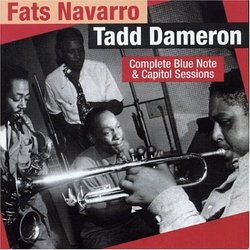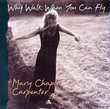| All Artists: Fats Navarro Title: Complete Blue Note & Capitol Members Wishing: 1 Total Copies: 0 Label: Definitive Spain Release Date: 8/3/2004 Album Type: Import Genres: Jazz, Pop Style: Bebop Number of Discs: 2 SwapaCD Credits: 2 UPC: 8436006491917 |
Search - Fats Navarro :: Complete Blue Note & Capitol
 | Fats Navarro Complete Blue Note & Capitol Genres: Jazz, Pop
|
Larger Image |
CD DetailsSimilar CDs |
CD ReviewsAs essential as music gets Kevin W. Celebi | Greencastle, IN | 03/21/2008 (5 out of 5 stars) "My discovery of Fats Navarro was through my school's music library's list of "available boxed sets." "Complete Blue Note" is enough to get any jazz fan worked up in excitement. Upon listening, I was blown away by Navarro's virtuosity, melodic beauty, and harmonic fertility. Also, when I realized that Tadd Dameron composed and arranged almost everything on these two discs, I was even more impressed by these two unheralded masters of bebop.
This extremely crucial set issues all of the recordings by Fats on the Blue Note label: recordings with him and Tadd as co-leader, some recordings of Dameron and young Miles Davis, some extremely impressive recordings of Fats and Bud Powell, and the only recorded encounter between Fats and Benny Goodman (which appears on at least thirty different compilations). It is a profound relief to have such vital and scrambled recordings on one set. There's a reason that Navarro was Clifford Brown's main (only?) influence: each improvisation tells a story, starting out with a beautifully executed line that continues to build upon itself. His vibrato was sparkling like a faint breeze and his trumpet excellence gave him the ability to take flight on short notice. Tadd Dameron's striking compositions, with classics such as Our Delight, The Chase, and Lady Bird, have the warm radiance of the sun and always sound exuberant (Dameron rarely ever composed in the minor key). The partnership between Navarro and Dameron combined two musicians whose eyes saw much further than their contemporaries - imagine how far their combined ability would have taken them in the 50's and beyond. Since this was before the LP era, the listener is still treated to short songs, around three minutes each. It's a pity that Navarro doesn't have longer time to stretch out and wail, or that Dameron's compositions and arrangements can't expand beyond the three minute mark and become even more symphonic in their microcosmic complexity. Many of the songs consist of a quick melody statement followed by a few one-chorus or half-chorus solos. Frustrating and tantalizing glimpses of the musicians' collective ability are shown. Many of the musicians on this compilation are heard in their earliest form, one of the blessings of 40's bebop recordings. Listen to altoist Ernie Henry blowing some of his earliest golden notes on record, his melodic statements slipping among glades of Dameron's chords, sleeping in the listener's ear and dreaming until Henry's next idea. Charlie Rouse is featured well before his Monk days, but doesn't take many solos. The recordings with Bud Powell speak for themselves - they announced a bright new star on the tenor saxophone, Sonny Rollins, and swiftly established Powell as a masterful composer of bebop melodies. Even Howard McGhee's battles with Navarro are included in the set. My favorite track from the compilation is the riveting "I Think I'll Go Away." Kenny Pancho Hagood makes his sole appearance, and to this reviewer, has one of the most gorgeous voices in jazz to ever exist. I'm not sure why critics call his voice an "acquired taste," but it adds grace to this recording in addition to The Birth of the Cool and Thelonious Monk's Blue Note recordings. Hagood does not dream alone, as he has a septet backing him. Imagine taking an incredible jazz voice and combining it with a septet arrangement by Tadd Dameron, including the beautiful counter-lines and vibrato of Navarro. It's surreal. Navarro's hour was short, seeing the man die at age 26 from pointless tuberculosis sped up by pointless heroin abuse. Even if you don't know his name, hearing his serene sound will give your soul ease. Tadd Dameron was an arranger of such fairness, his musical charts breezing of such good savor. Partner the two men, and the music holds many secrets and undiscovered moments, old, wonderful, and beautiful things in its treasuries, noble notes from the hearts of those that created it. " |

 Track Listings (36) - Disc #1
Track Listings (36) - Disc #1

